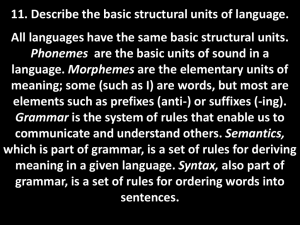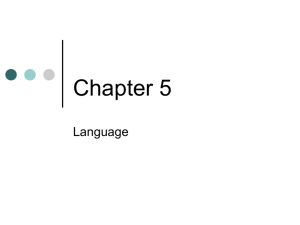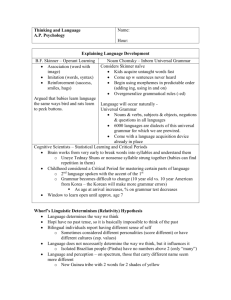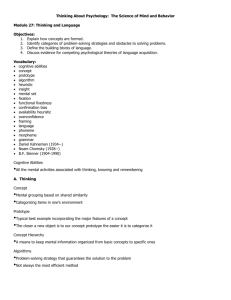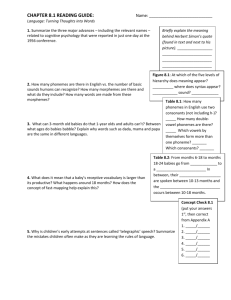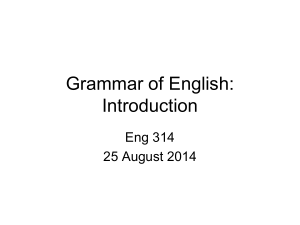Language - Grand Haven Area Public Schools
advertisement
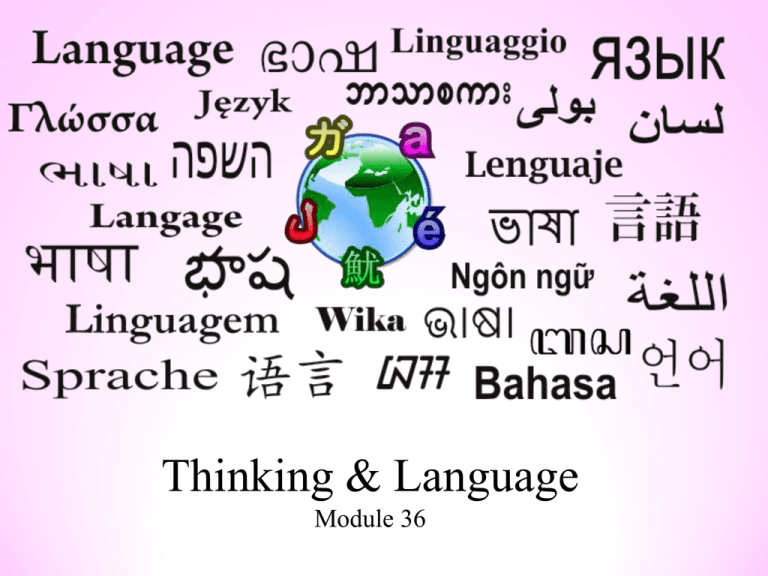
Thinking & Language Module 36 Language The spoken, written, or gestured words/symbols a group uses to communicate meaningfully Parts of Language • Symbol – sounds, written words or gestures. » Connection between symbol and its meaning is arbitrary or random making language flexible. » Meaning of symbols must be shared by others in order to communicate. • Semantics – What words mean • • Syntax – How we combine words. Phonology – How language is produced (a system of sounds) Generative – able to generate an unlimited number of different phrases and sentences. Displacement – ability to communicate about items, ideas and activities that are not physically present. • • Building Blocks of Language Phoneme • The smallest distinctive unit of sound of a spoken language • English has about 40 phonemes. • A young baby produces all the phonemes of all the languages of the world. Phonemes – How we produce the sounds of speech What is the first sound in the following words? a. Easy b. Judge c. Psychic d. Pneumonia e. Civic f. Apple g. Chutzpah What is the final sound in the following words? a. Judge b. Cheese c. Long d. Niece e. Checked f. Watch Note: The following letter combinations in English make just one sound: ch sh th ng ph How many phonemes (sounds) are in these words? Chin (3) Habits (5) thing (3) thought (3) psychology (8) Three (3) hopes (4) weigh (2) please (4) sun (3) Wish (3) enough (4) nation (5) quickly (6) laughed (4) Morpheme • The smallest unit, in a language, that carries meaning • May be a word or part of a word: – (prefix, root word, suffix) • English has about 100,000 morphemes. • How many Morpheme’s are in the following words? People Redevelopment Swimming Orange Literally Erasable Reddish Radish Language Grandmother 1 3 2 1 2 2 2 1 1 2 People Redevelopment Swimming Orange Literally Erasable Reddish Radish Language Grandmother Structure of Language Grammar • System of rules that help us get meaning from sounds (semantics) and put words in order to form meaningful sentences (syntax). LANGUAGE DEVELOPMENT How do you pronounce: ghoti? Pronounce gh …as in enough Pronounce o …as in women Pronounce ti …as in emotion Language: Language Acquisition Explaining Language Development If children learn language by conditioning and imitation, why do they say things they have never heard before? B.F. Skinner 1904-1990 vs Children learn to repeat what they hear because it brings them a reward. Noam Chomsky 1928- Skinner vs. Chomsky (1957) Skinner’s position (behavorist/nurture) – imitation – reinforcement – parents reward the use of language Chomsky’s position (nativist/nature) – language acquisition device – A person’s brain is hard wired to learn vocabulary and the rules of grammar (universal grammar) – critical period for learning language • At birth, infants can distinguish among the speech sounds of all the world’s languages. • By 10 months, they distinguish only the speech sounds that are present in the language to which they have been exposed. When Do We Learn Language? • Receptive Language – Ability to understand what is being said to you. First to develop. – By 4 months infants recognize speech sounds and stare longer at a face whose lips match the sound they hear • Productive Language – Ability to produce words. Develops in stages. Language Predisposition • Play “Language Predisposition” (3:44) – Segment #24 from The Mind: Psychology Teaching Modules – When can babies start to perceive the sounds of language? (Patricia Kuhl’s idea of baby statistics) – How is this studied? – Who does this support? Skinner or Chomsky? Encouraging language development: Motherese • Infant-directed speech found in all cultures used when talking to babies. • Motherese is characterized by distinct pronunciation, a simplified vocabulary, short sentences, a high pitch, and exaggerated intonation and expression. Language Acquisition Stages • In virtually every culture, infants follow the same sequence of language development, and at roughly similar ages. • Three-step process: • • • Cooing & Babbling One-Word Stage Two-Word Stage (Telegraphic Speech) Cooing and Babbling stage • At about 3 months of age, the infant begins to “coo.” • At about 5 months of age, the infant begins to babble. • Infants all over the world use the same sounds (phonemes) when they babble. • At around 10 months of age, babies begin to only hear & babble in the sounds specific to their language. • Babbling seems to be a biologically programmed stage of language development. Twin Babies Talk! Babbling and Language Development • IF TIME: Play “Talkin’ Babies” (10:00) - Episode 3: (Start at 33:32) – Segment #18 from Scientific American Frontiers DVD • • • • Why do babies babble? Is babbling tied to language or the ability to speak? Is Language Progression the same in deaf children? Do you see evidence for Skinner’s or Chomsky’s views on language development? • Is signing or speaking easier to learn? One-Word Stage • Long before babies become accomplished talkers, they understand much of what is said to them. – Comprehension vocabulary/Receptive Language (the words they understand) is much larger than their production vocabulary (the words they can say). • Around their first birthday, infants produce their first real words — usually referring to concrete objects or people that are important to them • Holographic Speech - Child uses one word and vocal intonation to convey a complete thought or idea “Ball!” (Look! There is a ball!) Two-Word Stage • Around age 2, infants begin putting words together to construct simple “sentences.” • Telegraphic Speech - Two word sentences showing an appreciation of the rules of grammar – Seeing a red car, the child says, “red car” rather than “car red” • Children move beyond the two-word stage at around 2.5 years of age. • Language production and comprehension increase dramatically thereafter – children may have a production vocabulary of over 10,000 words by school age. “Want Ball!” (Can I please have that ball?) Noam Chomsky Interview • Chomsky’s idea of Universal Grammar (3 min) • Chomsky gives an example of Universal Grammar (1 min) – Video #21 from Worth’s Digital Media Archive for Psychology. Pragmatics • • • • How Language is used in everyday settings. This helps us understand ambiguous language Example: “Could you pass the salt?” Is not a question of whether you are capable of lifting the salt shaker. Overgeneralization • Child will generalize grammar rules so they apply the rules too broadly if they haven’t learned the word for it. • Example: If a child hasn’t learned the word, “dug” they will apply the grammar rules to the word they do know, “dig”. – “I digged in the sandbox” rather than “I dug in the sandbox” Grammar Development • A system of rules governing how one can combine sounds and words and arrange them into sentences to communicate with others • “Gleason’s Wug Test” (1 min) – Video #22 from Worth’s Digital Media Archive for Psychology. – shows how kids apply grammar to new concepts • Play “Born to Talk” (6:45) – Segment #21 from Scientific American Frontiers DVD • Wug test is used to show universal grammar being applied by kids. • Watch how grammar rules get overgeneralized. What does this show us about language development? • Who does this research support? Skinner or Chomsky? Sign Language & Grammar If time allows: Watch “Human Language: Signed & Spoken” (6:04). - from The Mind DVD Segment 25 – Does sign language use grammar? – Which areas of the brain are used for sign language? – Do users of sign language use different areas of the brain? Is there a Critical Period for Language? • Language develops within a critical period – Infants seem to do statistics on what they hear and learn what to listen for and later reproduce themselves – Patricia Kuhl (see TED Talk regarding this – 10 min) – If not exposed to language by age 7, child will gradually lose their ability to master any language • They can master basic words but never become totally fluent nor comprehend all the parts of grammar like a fluent speaker • See example of Genie – The Wild Child (43 min) Genes design the mechanisms for a language, and experience activates them as it modifies the brain New language learning gets harder with age Language and the Brain • Play “Old Brain, New Tricks” (11:00) Segment #8 from Scientific American Frontiers DVD • What areas of the brain are being used as you process language? • Do adults and children under 4-5 process language in the same ways? • Is there a critical time to learn a second language if you want to speak it like the natives? Language and the Brain • Aphasia—partial or complete inability to articulate ideas or understand language because of brain injury or damage • Broca’s area—plays role in speech production • Wernicke’s area—plays role in understanding and meaningful speech Aphasias • Broca’s Aphasia – Damage to Broca’s Area causes a person to struggle formulating words while still being able to comprehend speech. – Example: Broca first discovered this area when he had a patient with damage to this area who could only say “tan” • Wernicke’s Aphasia – Damage to Wernicke’s Area would cause a person only to be able to speak in meaningless words. – Example: Asked to describe a picture of two boys stealing cookies from behind a woman’s back, a patient responded: – “Mother is away her working her work to get her better, but when she’s looking the two boys looking the other part. She’s working another time.” • Mnemonic to remember: You can't read Wernicke's words and Broca's makes you babble Language Areas of the Brain How We Read Out Loud Language and Thinking • Do our ideas come first and then we name them or are our thoughts conceived in words to begin with? • Does our language determine what we can think? – Bilingual people report different senses of self and personalities depending on which language they are using – Linguistic determinism is the notion that difference among languages cause difference in the thoughts of their speakers Linguistic Determinism - (Whorfian) Hypothesis • Hypothesis that one’s language determines one’s thoughts & perceptions about their world. • Proposed by Benjamin Whorf (1897-1941) • This thought to be wrong. Instead, our perceptions & thoughts influence the language we use to describe those words. – Rosch’s Dani color perception experiment: • Although the Dani lack words for all the English colors (their language contained only two color terms dividing all colors into either the "light, bright" category or the "dark, cool" category), • Rosch showed that they could still categorize objects by colors for which they had no words Language’s Influence on Thought • Cognitive psychologists today say language can influence perception & thought. – Some concepts may be easier to learn or express in one language than another. (counting 10-20 in English & Chinese) • Language & Social Perception – nuances of words can influence our social perception of others reinforcing or minimizing negative stereotypes. (i.e. jock vs. athlete). • Language & Gender Bias – using masculine pronouns tends to produce images of males and exclude females. How would you refer to a(n) _______ if you wanted to convey a positive or negative connotation? • • • • • • • Smart Person Farmer Women’s Rights Advocate Person Who Tends To Save Money Politician Self-Confident Person Lawyer Not All Thinking is in Words • Mental Images – Watching a person do a task you’ve learned will activate the same areas of the brain as if you were doing the task yourself. • The same is true when you imagine yourself doing the task. – Mental Rehearsal Fun with Language Examples of Ambiguous Language • • • • • • • There is a fork in the road ahead. California is a great state despite its faults. The car was stopped by the tree. This is my old friend. The shooting of the teacher was terrible. Never threaten someone with a chainsaw. Norman Rockwell painted me on the front porch. Norman Rockwell painted me on the front porch. Norman Rockwell painted me on the front porch. Norman Rockwell painted me on the front porch. Paradoxes in the English Language • Why does night fall but never break and day break but never fall? • Why can homework be done in school? • Why are people who ride motorcycles called “bikers” and people who ride bikes called “cyclists?” • Why can your nose run and your feet smell? • Why are boxing rings square? • Why do we park in a driveway and drive on a parkway? • Why does quicksand work slowly? • Why is phonetic not spelled phonetically? Washington Post Alternative Meanings Contest Coffee (n.): - a person who is coughed upon. Flabbergasted (adj.): - appalled over how much weight you have gained. Willy-nilly (adj.): - impotent. Testicle (n.): - a humorous question on an exam. Washington Post Alternative Meanings Contest Negligent (adj.): - describes a condition in which you absentmindedly answer the door in your nightgown. Oyster (n.): - a person who sprinkles his conversation with Yiddish expressions. Abdicate (v.) - to give up all hope of ever having a flat stomach. Washington Post Alternative Meanings Contest Flatulance (n.): - the emergency vehicle that picks you up after you are run over by a steamroller. Circumvent (n.): - the opening in the front of boxer shorts. Doublespeak - language deliberately constructed to disguise its actual meaning Revenue enhancement - tax increase Inoperative statement - lie Social expression products - greeting cards Media courier - newspaper carrier Negative patient care outcome - death Doublespeak Period of accelerated negative growth - recession Underground condominium - cemetery Oral hygiene appliance - toothbrush

